The Monero Moon (Issue 70)
The Monero Moon is a curated newsletter covering all the latest news within Monero (XMR). We are driven by a compelling need to champion both freedom and financial privacy!
Table of Contents:
Development, Releases, and Technology
General News
Events
Exchanges and Merchants
Community Crowdfunding
Trading and Speculation
Network Metrics
Entertainment
Development, Releases, and Technology
Cypher Stack has completed their review of Luke Parker’s FCMP++, detailing a full-chain membership proof construction and providing a relevant security analysis. You can read the review here.
Rucknium has released Monero Stressnet Node v250.18.3.3.2, introducing a new stressnet monitor. Announced in the latest community meeting, the monitor provides up-to-date insights into the stressnet's status, despite occasional downtimes. The blockchain explorer, however, faces challenges due to node strain. Key updates include internal data structure changes, peer ban adjustments, and block sync optimizations. More information can be found here.
Additionally, Rucknium, with thanks to Spackle, shared the first-week report on the Monero Stressnet project, highlighting significant improvements. Key updates include a massive speed-up in node restart times and enhanced handling of larger blocks. Notable achievements include processing 33,074 transactions in an hour and a 2.49 MB block at height 2521514.
Woodser has released v0.8.31 of the monero-java library. This update includes libraries built from Ubuntu 20.04 for x86_64 and arm64 architectures, enhancing compatibility and performance.
Woodser has released v0.9.9 of the monero-ts library, featuring various fixes, updates, and improvements. Monero TypeScript Library is a library for creating Monero applications using RPC and WebAssembly bindings to Monero v0.18.3.3 'Fluorine Fermi'. Key changes include fixing URL parsing issues in Next.js, updating documentation for wallet RPC getBalances(), adding 'web-worker' to Node.js externals, and enhancing error handling and connection stability. Additional updates address documentation, exception handling, and command-line operations in English.
SChernykh has released P2Pool v4.0 with merge mining support, which will be enabled after its next hardfork on October 12, 2024. This is not a Monero blockchain hardfork. Users must update to P2Pool v4.0 or newer before this date. Key updates include parallel calculation of hashing blobs, a starting difficulty for autodiff, and several bug fixes. This marks P2Pool’s second hardfork, following its successful upgrade on March 18, 2023. More information is available here.
Nahuhh aka ofrnxmr has released v0.13.4 of basicswap-bash, a suite of bash scripts designed to install and manage BasicSwapDEX on Windows (WSL), Debian, Ubuntu, Arch, and Fedora. Detailed installation instructions can be found on the GitHub release page.
Binarybaron has released UnstoppableSwap GUI v0.6.2, featuring several updates and improvements. Key changes include a button to open the data directory in the file explorer, clickable links for individual update release files, a debug switch converted to an icon button on the swap dialog, and the ability for users to submit feedback while a swap is running. Additionally, electron has been updated to 26.2.1 and swap-cli to 0.13.2. More information can be found here.
Atomic Monero has introduced Ethereum to Monero Atomic Swaps using the AthanorLabs ETH->XMR protocol. According to reports, this new feature has been live for several weeks and is working smoothly. For more details, visit Atomic Monero.
Additionally, binarybaron and einliterflasche have submitted a CCS proposal to continue developing XMR-BTC atomic swaps, aiming to transform the ecosystem from a prototype to a mature marketplace. The six-month project will focus on maintaining and improving both the GUI and CLI, making the GUI more user-friendly and potentially releasing a mobile version for Android and iOS. They also plan to manage the GUI webpage, documentation, and a public registry of swap providers. More information and discussion can be found here and here.
Woodser has released Haveno v1.0.8, now featuring support for Tails with an install script and documentation. Haveno is a privacy-focused, non-custodial, decentralized exchange for Monero. It can be operated on Monero's main network via a third-party Haveno network. This update brings various improvements, updates, and bug fixes, including Turkish translation, stale data error fix, Tor disablement for private IP addresses, fallback to provided nodes on startup errors, and more. Additionally, enhancements to trade summaries and Monero binaries for Linux ARM64 are included. Full details and installation instructions can be found on the GitHub release page.
Monero Suite is the ultimate toolkit for managing Monero securely, privately, and with ease. Perfect for all Monero enthusiasts, it now features a "1 click installation script." Check it out at monerosuite.org.
Home cloud operating system umbrelOS has added support for running a full Monero node, thanks to deverickapollo. The Monero Node application, now available in the official App Store, is compatible with umbrelOS version 0.5 and above.
Cake Labs has released Monero.com v1.16.0 and Cake Wallet v4.19.0, now supporting Wownero wallets along with various Monero fixes and enhancements. For more details and to download the wallet, visit the GitHub repository or the Cake Labs website. Note that Monero.com is a Monero-only wallet, while Cake Wallet supports multiple coins including Monero.
MrCyjanek has posted a fourth CCS progress report, marking the completion of the first milestone for their Unnamed Monero Wallet development proposal. The update includes improvements to iOS builds, CI for iOS, removal of a dependency for Android, patches ported to Wownero, and the addition of a dummy device for Ledger. The xmruw updates feature dependency updates, an auto-save feature, a user-friendly home screen redesign, and prompts for online services. Further information can be found here.
Busyboredom has released AcceptXMR v0.14.0 along with the initial version (v0.1.0) of AcceptXMR-Server, a comprehensive Monero payment gateway. AcceptXMR aims to provide a simple, reliable, and efficient means to track monero payments. This release marks the completion of the first milestone, ‘Dockerizing AcceptXMR’, from busyboredom's CCS proposal. The developer is now working on implementing a WordPress plugin as the next milestone. More information can be found here.
DiosDelRayo has released MoneroSigner v0.4, announcing MoneroSigner is rebranding to XmrSigner to avoid confusion with the similarly named abandoned project. Key updates include a view-only wallet QR, a new logo, version updates, and code refactoring.
hinto-janai has released Gupax v1.3.9, featuring an update to its list of XMR remote nodes, specifically removing xmrnode.facspro.net. Gupax is a GUI for mining Monero on P2Pool using XMRig. The release also bundles P2Pool v4.0 and XMRig v6.21.3. Full details are available on GitHub and the Gupax website.
Cyrix126 has released Gupaxx v1.2.0, now with support for Xmrig-Proxy, along with several bug fixes and updates. Gupaxx, a maintained fork of Gupax, integrates the XMRvsBeast Raffle. It simplifies mining on P2Pool and allows optional participation in the raffle. This release allows users to point their miners to the Gupaxx instance, automatically redirecting Xmrig to Xmrig-Proxy when enabled. Key changes include a new tab in the UI, integration with XMRig and XvB processes, improved debugging, and updated documentation. The update also bundles P2Pool v3.10, XMRig v6.21.1, and XMRig-Proxy v6.21.1. Full details are available on GitHub.
Keith Irwin (ki9) has submitted a CCS proposal to develop Pago, a lightweight and easy-to-deploy Monero payment gateway that can be embedded into any website. Pago, meaning "payment" in Esperanto, aims to feature flexible HTML/CSS/JS frontends and minimal external dependencies, aiming to facilitate Monero acceptance for businesses and promote a circular economy.
Selsta has posted their June 2024 Monero dev report, highlighting several updates. Key points include continued work on v0.18.3.4, delayed due to bugs found by the stressnet, assistance with an OSS-Fuzz issue, initial support for the stressnet, and various smaller bug fixes. Check it out here.
Justin Berman has published a second progress report for his full-time 2024 Monero and Seraphis development work, covering 350 hours of effort. Key achievements include completing the first pass of the grow_tree and trim_tree algorithms and tests, marking a significant FCMP integration milestone, and submitting a PR to improve wallet synchronization.
Monero Observer has released a new Monero Dev Activity Report to provide a big-picture view of Monero's development activity throughout the past week. If you’re interested in the nitty gritty, check it out here.
HardenedSteel has created an excellent list for those looking to contribute to Monero without programming skills. This guide helps onboard new contributors and offers various ways to get involved, including donating money, selling products, donating computing power, sharing XMR knowledge, translating, programming, and more. Join the Matrix room for any questions and start contributing to the Monero community today!
VOSTO EMISIO has released a video on RandomX, Monero's proof-of-work algorithm designed to be ASIC-resistant and optimize for CPU mining. Check out the informative video featuring Xenu, made possible by CCS-funders.
Ex-Monero Core Team member Riccardo Spagni tweeted about Monero's progress towards greater decentralization. He shared two screenshots from MoneroHash scanning active, addressable full Monero nodes: one from January 2017 with 702 nodes and another from today with 4,386 nodes, showcasing the growth over 7.5 years. In fact, when examining the node distribution, it appears there are almost 13,000 recently active nodes according the monero.fail/map.
General News
As the war in Ukraine continues, the demand for soldiers has led to stricter measures against draft dodgers, including freezing their bank accounts and seizing property. This has caused many men to go into hiding or attempt dangerous escapes. Monero offers a potential solution by providing a decentralized and private means of financial transactions, allowing individuals to manage and move their funds without fear of government intervention or bank account freezes. Monero's privacy features can help protect the financial autonomy of those caught in the increasingly desperate measures to conscript soldiers. For more details, you can learn more about this issue here.
Using a private cryptocurrency like Monero on decentralized exchanges (DEXs) can help avoid the dangers associated with KYC processes, which require trusting third parties with sensitive information. This trust can be dangerous, as it exposes users to potential threats and vulnerabilities. Monero offers enhanced security by keeping user balances hidden, unlike public blockchains where balances are visible to everyone. This privacy reduces the risk of targeted attacks, such as those experienced by victims of a violent gang that used physical coercion to steal crypto. You can learn more about this issue here in a recent Wired article titled ‘Inside a Violent Gang's Ruthless Crypto-Stealing Home Invasion Spree’.
All MoneroKon 2024 talks are now available as podcasts on Spotify, self-hosted on Castopodon, and on YouTube. Listen on Spotify at spotify.monerokon.org, on Castopodon at audio.degooglemonero.com/@MoneroKonPodcast, or watch on YouTube on the channel Monero Community Workgroup.
In Episode 111 of The Watchman Privacy Podcast, Gabriel interviews Seth for Privacy about advanced Monero ‘tactics’ and its next steps. They discuss acquiring no-KYC Monero, the importance of running your own node, using Tor with Monero, and more. Check out the full episode for an in-depth exploration of Monero privacy strategies and insights.
In a recent episode of Monero Talk, Doug joined Danny Akston, Paul Puey (CEO of Edge), and Sterlin Luján (anarchist activist) live at PorcFest 2024. They discuss privacy in cryptocurrency, challenges due to government crackdowns on tools like Tornado Cash and Samurai Wallet, and the adoption and usability of privacy coins. The episode also explores the legal and regulatory landscape and its potential impact on the crypto ecosystem. Check it out here.
In Monerotopia episode #173, Doug presents the XMR Report with bawdyanarchist, covers the latest XMR news with Tuxsudo, and features special guest BitcoinLixin to discuss KeystoneWallet's new support for Monero.
Francisco Cabañas (a.k.a. ArticMine) featured on the CitizenWeb3 podcast, where he discussed the "War on Privacy," the risks of surveillance, and the benefits of decentralizing the banking industry. He highlighted Monero's swift transaction times, strong privacy features, and solutions to blockchain scaling issues. The episode covered various topics including compliance, government impact, and the importance of risk mitigation in the cryptocurrency space. Listen to the full episode for an in-depth conversation on these critical issues.
Check out the latest blog posts on the LIBERECO website. Read ‘The New World Order: From Dollar To CBDC’ and explore the guide ‘Monero Cold Storage with Feather & Anonero’ to learn how to configure Monero cold storage. Both articles are available on the LIBERECO website.
George Nicholas, a long-time Monero community member and creator of the award-winning short film "Límite," which features Monero, provided an update on the film's campaign. The film was featured in 17 festivals and won 6 awards. Despite qualifying for the Oscars through theatrical exhibition and competing among 187 short films, it did not receive a nomination. The film premiered at the San Diego International Film Festival and had screenings for Academy voters in Los Angeles and New York. The campaign, supported by generous donations, was managed by professional film publicists. The film was also screened at MoneroKon in Prague, receiving positive feedback, and there are ongoing efforts aim to secure a streaming platform to reach a broader audience. More information can be found here.
Ivan on Tech, a YouTuber with over 500k subscribers, recently discussed Monero in a live stream. Check it out here, discussion starts around 17:50.
Monero Observer published Monero Observer Blitz #31 - June 2024. The Monero Observer Blitz is a recap of what happened in the Monero community this past June.
Revuo Monero recently celebrated its 200th issue and has now published Issue #201. Don't miss out on your weekly dose of Monero news!
Monero Lover has launched a new Monero imageboard at monero.land. Check it out for Monero-related images and discussions!
Events
A Monero Research Lab (MRL) meeting will take place on Wednesday, July 17, 2024 at 17:00 UTC. You can find more information about the meeting here, thanks to the Monero Observer. The MRL meeting will take place in the #monero-research-lab channel if you want to lurk in real-time.
The next Seraphis Wallet Workgroup meeting is on Monday, July 15, 2024 1800 UTC in the #no-wallet-left-behind IRC channel. You can learn more about Seraphis here.
The next Cuprate Meeting is scheduled for July 16, 2024, at 18:00 UTC in the #cuprate channel on IRC. Cuprate is an alternative Monero node, written in Rust, designed to independently validate Monero consensus rules, providing added security, redundancy, and improved memory safety for the network. More information can be found here and here.
Exchanges and Merchants
XMR was the most used cryptocurrency on Coincards in June 2024, according to a usage report recent. The breakdown by dollar volume shows XMR at 34.4%, a 6.82% increase, surpassing Bitcoin for the first time. Other notable cryptocurrencies include BTC at 25.96%, USDC at 20.20%, and ETH at 9.84%. Monero climbed two spots since the previous report in May 2024.
Cake Wallet has announced the return of Cake Pay! Now you can buy gift cards privately using your favorite cryptocurrencies from top-notch merchants. Download the latest update of Cake Wallet to enjoy the convenience of Cake Pay!
AllArk has launched an instant and private method to send stablecoins into and out of the Monero ecosystem using Zero-Knowledge Proofs (ZKPs). This new feature supports XUSD, a stablecoin on ETH/ARB chains, which utilizes Railgun's protocol to hide transaction details, ensuring privacy. Users can now mint as little as $10 of XUSD using Monero and will soon be able to cash out XUSD to their bank accounts. This innovation offers a private and quick way to manage funds, complementing Monero’s existing privacy features. More information can be found here.
LIBERECO has introduced a new resource page, "Accept Monero," featuring tools to help businesses start accepting Monero payments. Check out their extensive list of other Monero resources here.
Community Crowdfunding
Several crowdfunding proposals are awaiting community feedback before they can start accepting funds through the Community Crowdfunding System (CCS). For now, they are just proposals, but if they receive some positive feedback from the community they will be moved to a “Funding Required” stage so that they can accept Monero donations through the CCS.
The Monero Observer CCS proposal for 2024 Q3 is now ready for community review. The proposal includes maintaining the Monero Observer website for the next three months (July, August, and September). You can support the proposal by posting your feedback here.
There are also a large number of independent fundraisers taking place over on Kuno and Monero Bounties.
Trading and Speculation
VectorAlgo predicts the XMR/USDT price has hit resistance and appears to be rejected, with confirmation pending the candle close. A long trade can be considered once the price retraces, with good potential for a bull run if it bounces back from the support zone.
Network Metrics
Total Monero in Circulation — 18,461,409 XMR
Monero Total Marketcap — $2,925,315,644
Coinmarketcap Ranking — #28
XMR/USD Price — $158 USD
XMR/BTC Price — 0.002726 BTC
Monero.Boats’ Monero Street Price — $158 USD (+0.16%)
Average Transaction Fee — 0.00042 XMR ($0.066)
Monero Network Hashrate —2.47 Ghash/s
Monero Mining Pools Hashrate Distribution —
Entertainment
Donate
If you like the newsletter and want more of this content, then shout me a round of beers by donating some spare Monero you didn’t lose during your boating accident.
8C2xtdsCmJGhUgvMWYLayRR1wFgrjtQ2wNvzgFfrAfbjW7gatQDiNjUfFX7K5cm9UVefrVPFmxiM4jhhybsLQGpG1aeRzfD
Have we missed something?
Please contact me if you believe I have missed an important piece of news, or want something included in a future issue.
Support Monero
Want to help contribute to the Monero Project? Developers, marketers, event coordinators, translators, Instagram personalities, meme creators, and public speakers — whatever your skills may be, it is extremely likely there is something you can do to assist. Reach out to the Monero community on Reddit, IRC, GitHub, Twitter, or Telegram. The official Monero website is GetMonero.org.
Past Issues
Issue 69 / Issue 68 Issue 67 Issue 66 / Issue 65 / Issue 64 / Issue 63 / Issue 62 / Issue 61 / Issue 60 / Issue 59 / Issue 58 / Issue 57 / Issue 56 / Issue 55 / Issue 54 / Issue 53 / Issue 52 / Issue 51 / Issue 50 / Issue 49 / Issue 48 / Issue 47 / Issue 46 / Issue 45 / Issue 44 / Issue 43 / Issue 42 / Issue 41 / Issue 40 / Issue 39 / Issue 38 / Issue 37 / Issue 36 / Issue 35 / Issue 34 / Issue 33 / Issue 32 / Issue 31 / Issue 30 / Issue 29 / Issue 28 / Issue 27 / Issue 26 / Issue 25 / Issue 24 / Issue 23 / Issue 22 / Issue 21 / Issue 20 / Issue 19 / Issue 18 / Issue 17 / Issue 16 / Issue 15 / Issue 14 / Issue 13 / Issue 12 / Issue 11 / Issue 10 / Issue 9 / Issue 8 / Issue 7 / Issue 6 / Issue 5 / Issue 4 / Issue 3 / Issue 2 / Issue 1
Socials
If you have suggestions, corrections, or feedback, please contact me on Twitter @johnfoss69 or Reddit u/johnfoss68.
DISCLAIMER: This publication contains opinions for informational and entertainment purposes only and does not constitute investment advice. Information may contain errors and omissions; use it solely at your own risk. The author of this publication and/or the authors of articles linked to or from this site may have financial investments that could bias their opinions, including ownership of Monero currency. No website, service, or product mentioned in the newsletter constitutes an endorsement; use them at your own risk. Always do your own research, form your own opinions, and never take risks with money or trust third parties without verifying their credibility.










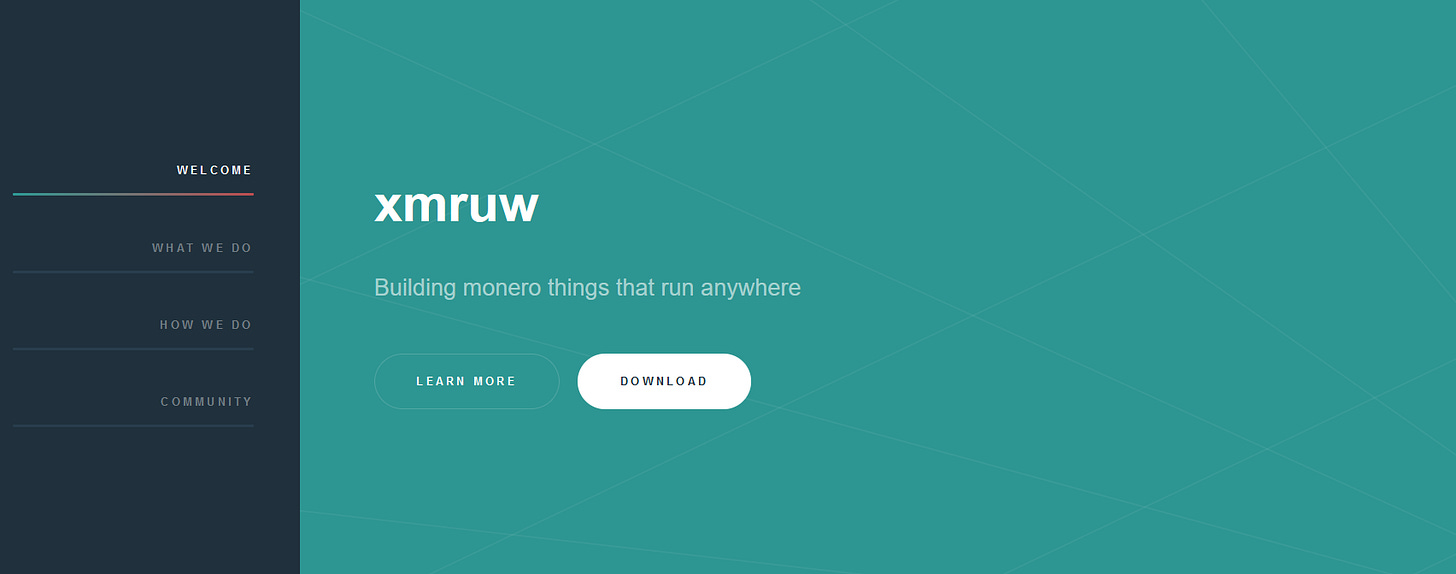






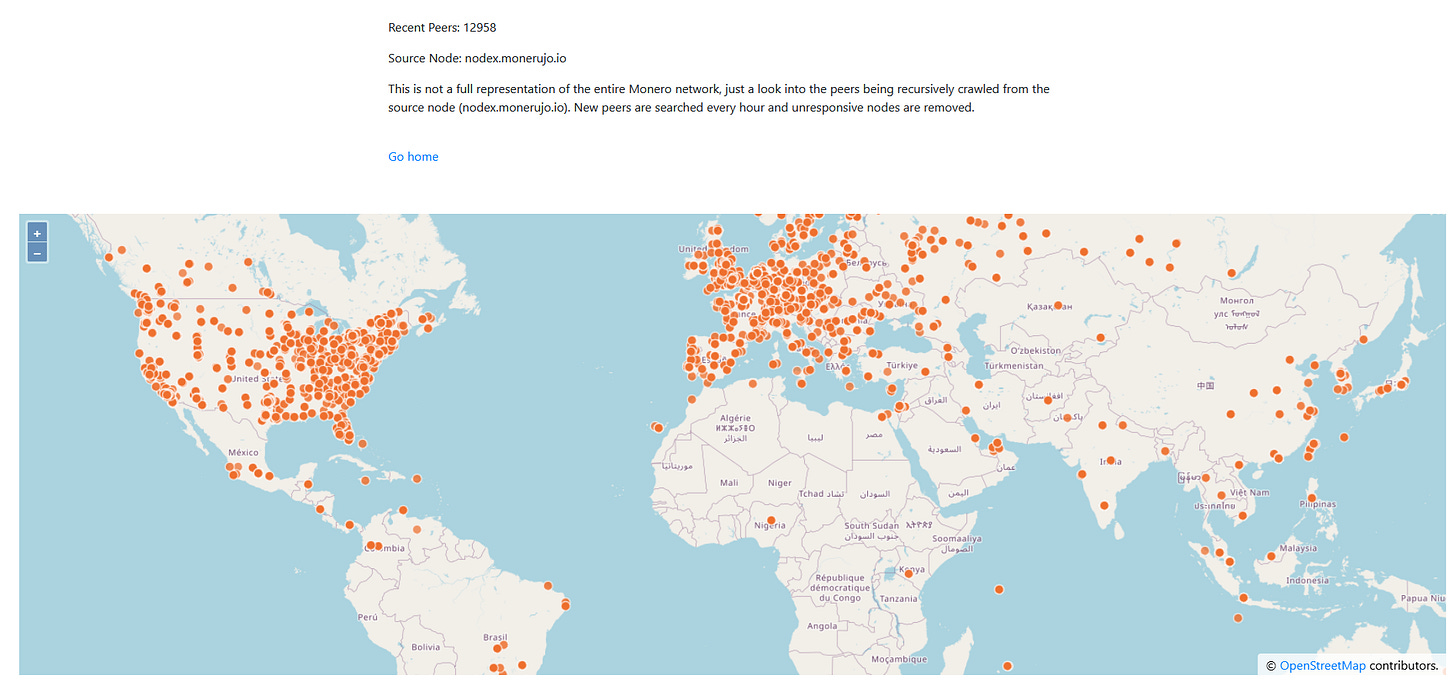

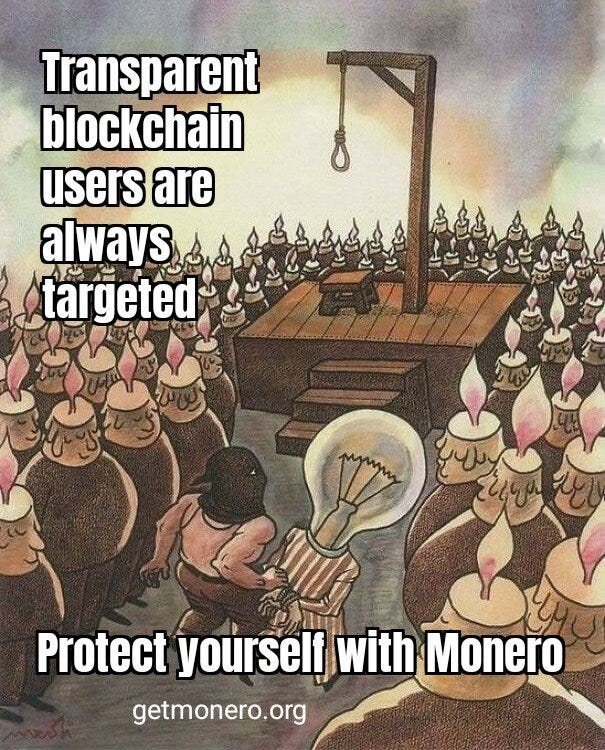







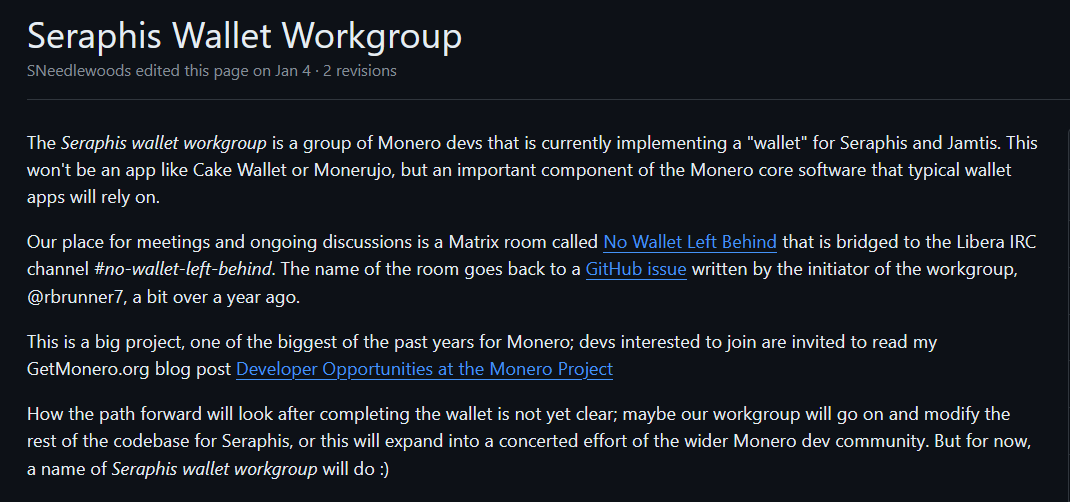
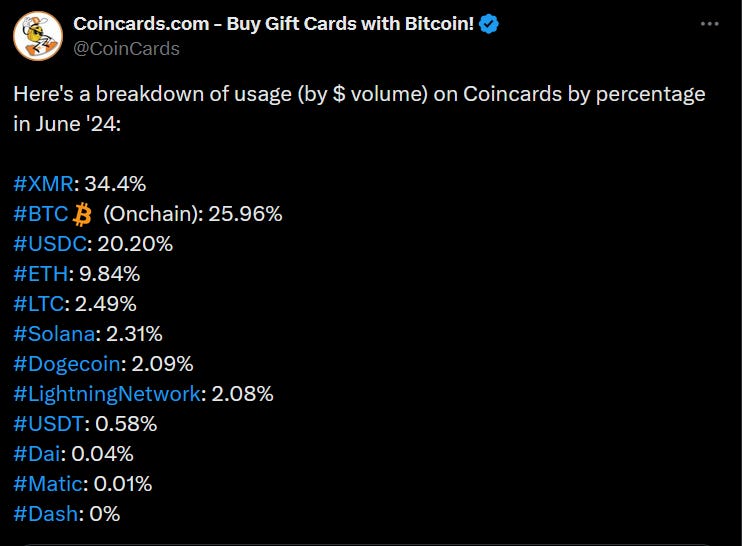



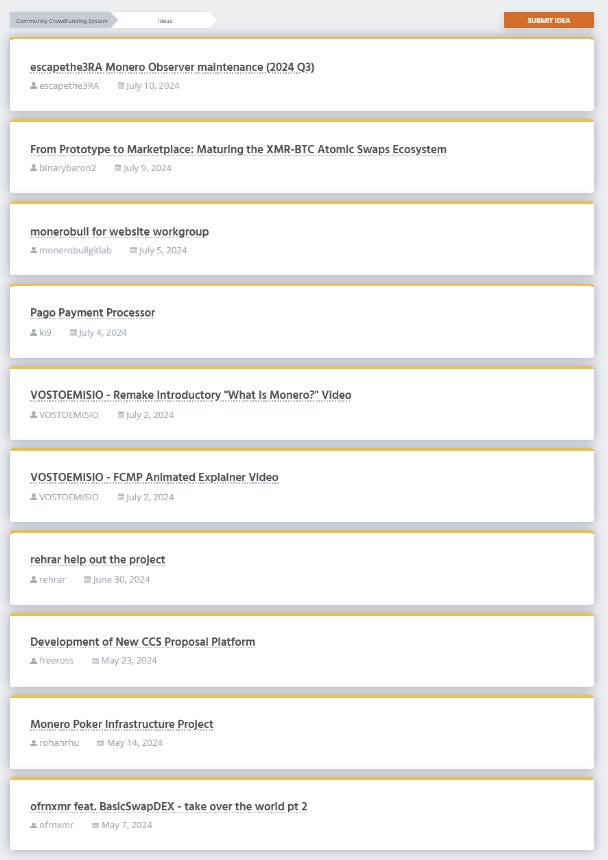





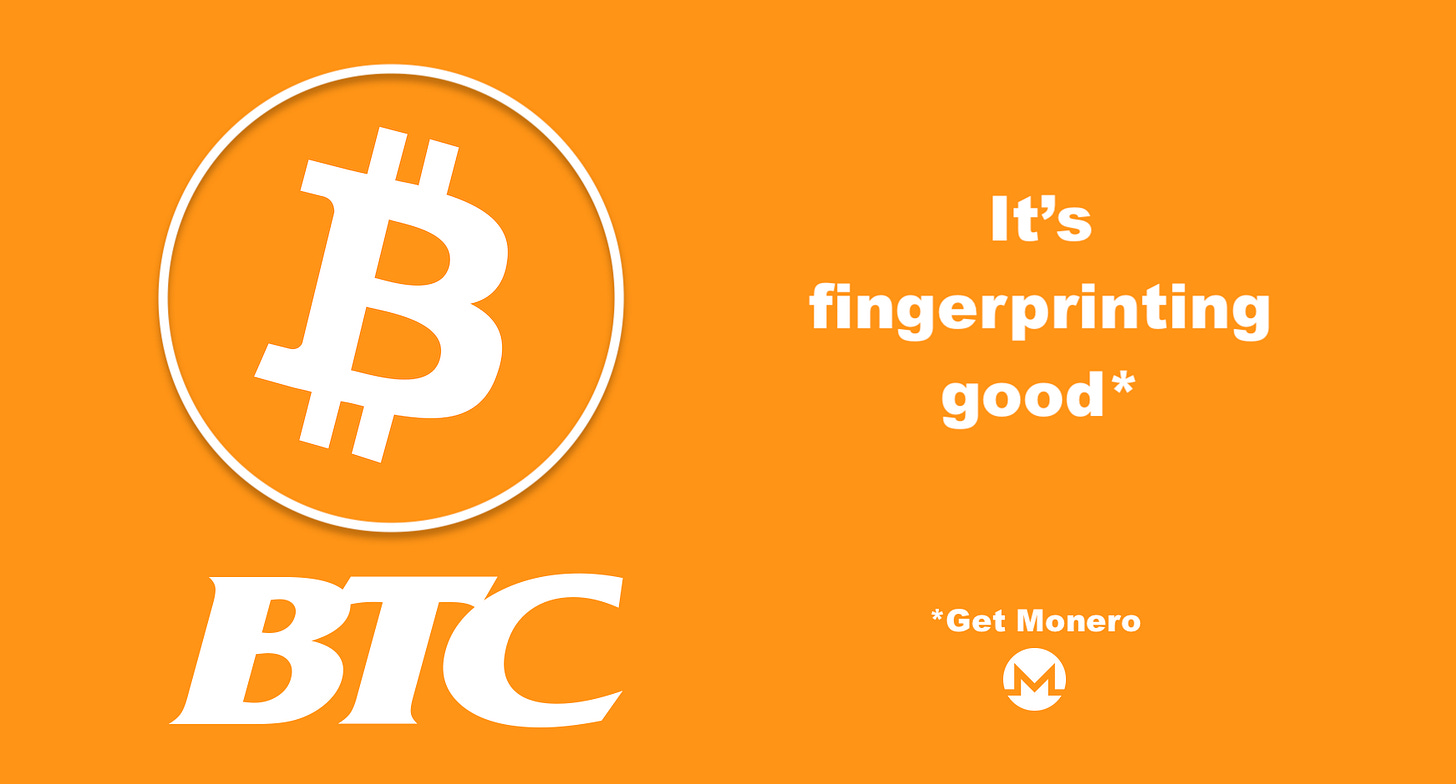





amazing! Thank you so much for bringing this together in one place. With such a dispersed community (and of course lousy institutional media coverage) it is difficult to find out quickly what's happening in the XMR space.